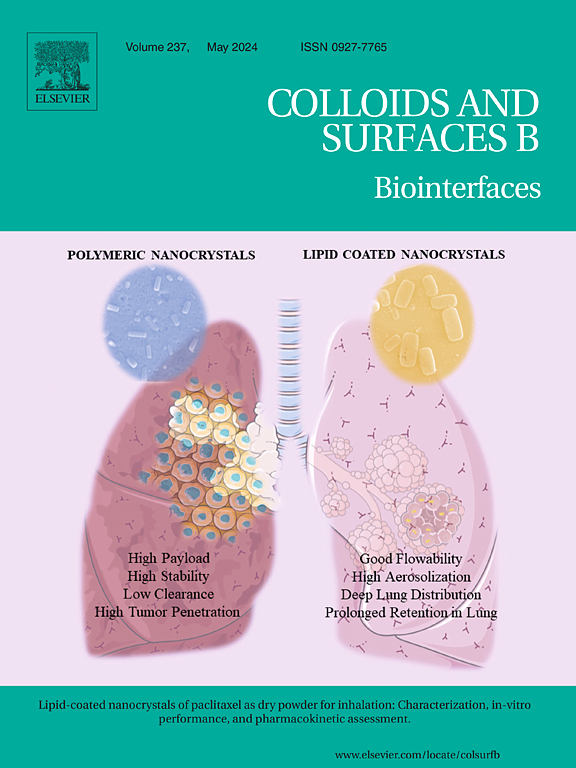用改性磷脂酰胆碱稳定的白桦脂酸纳米乳液提高了纳米系统的稳定性和药物的生物利用率。
IF 5.4
2区 医学
Q1 BIOPHYSICS
引用次数: 0
摘要
白桦脂酸(BA)是一种天然化合物,具有治疗癌症和艾滋病等多种疾病的巨大潜力,并具有额外的消炎和抗菌特性。然而,由于白桦脂酸在水中的溶解度较低,影响了其在体内的分布,因此其临床应用受到了限制。为了克服这一难题,人们开发了纳米乳剂来提高这类溶解性较差药物的生物利用度。本研究对改性磷脂酰胆碱(PC)进行了研究,用共轭亚油酸(CLA)取代了部分脂肪酸,以稳定 BA 纳米乳剂。改性 PC 被用于制备液滴大小达 45 纳米的纳米乳剂。这些纳米乳剂在室温(25°C±2°C)和冷藏(5°C±1°C)条件下可保持稳定 60 天,且无不稳定性迹象。与使用天然 PC 的纳米乳剂(82.8±4.2%)相比,使用 CLA 改性 PC 稳定的纳米乳剂实现了更高的药物包封率(93.5±4.3%)。在体内模型中,两种纳米乳剂配方都能显著提高 BA 的吸收率,与游离药物相比,CLA 改性 PC 的吸收率提高了 21.3±1.3 倍,天然 PC 的吸收率提高了 20±2.3 倍。这表明改性 PC 纳米乳剂可提高 BA 在临床应用中的稳定性和疗效。本文章由计算机程序翻译,如有差异,请以英文原文为准。
Nanoemulsions of betulinic acid stabilized with modified phosphatidylcholine increase the stability of the nanosystems and the drug's bioavailability
Betulinic acid (BA) is a natural compound with significant potential for treating various diseases, including cancer and AIDS, and possesses additional anti-inflammatory and antibacterial properties. However, its clinical application is limited because of its low solubility in water, which impairs its distribution within the body. To overcome this challenge, nanoemulsions have been developed to improve the bioavailability of such poorly soluble drugs. This study investigated modified phosphatidylcholine (PC), where some fatty acids were replaced with conjugated linoleic acid (CLA) to stabilize BA nanoemulsions. The modified PC was used to prepare nanoemulsions with droplet sizes of up to 45 nanometers. These nanoemulsions maintained stability for 60 days at room temperature (25°C±2°C) and under refrigeration (5°C±1°C), with no signs of instability. Nanoemulsions stabilized with CLA-modified PC achieved a higher drug encapsulation rate (93.5±4.3 %) than those using natural PC (82.8±4.2 %). In an in vivo model, both nanoemulsion formulations significantly increased BA absorption, with CLA-modified PC enhancing absorption by 21.3±1.3 times and natural PC by 20±2.3 times compared to the free drug. This suggests that nanoemulsions with modified PC could improve the stability and efficacy of BA in clinical applications.
求助全文
通过发布文献求助,成功后即可免费获取论文全文。
去求助
来源期刊

Colloids and Surfaces B: Biointerfaces
生物-材料科学:生物材料
CiteScore
11.10
自引率
3.40%
发文量
730
审稿时长
42 days
期刊介绍:
Colloids and Surfaces B: Biointerfaces is an international journal devoted to fundamental and applied research on colloid and interfacial phenomena in relation to systems of biological origin, having particular relevance to the medical, pharmaceutical, biotechnological, food and cosmetic fields.
Submissions that: (1) deal solely with biological phenomena and do not describe the physico-chemical or colloid-chemical background and/or mechanism of the phenomena, and (2) deal solely with colloid/interfacial phenomena and do not have appropriate biological content or relevance, are outside the scope of the journal and will not be considered for publication.
The journal publishes regular research papers, reviews, short communications and invited perspective articles, called BioInterface Perspectives. The BioInterface Perspective provide researchers the opportunity to review their own work, as well as provide insight into the work of others that inspired and influenced the author. Regular articles should have a maximum total length of 6,000 words. In addition, a (combined) maximum of 8 normal-sized figures and/or tables is allowed (so for instance 3 tables and 5 figures). For multiple-panel figures each set of two panels equates to one figure. Short communications should not exceed half of the above. It is required to give on the article cover page a short statistical summary of the article listing the total number of words and tables/figures.
 求助内容:
求助内容: 应助结果提醒方式:
应助结果提醒方式:


